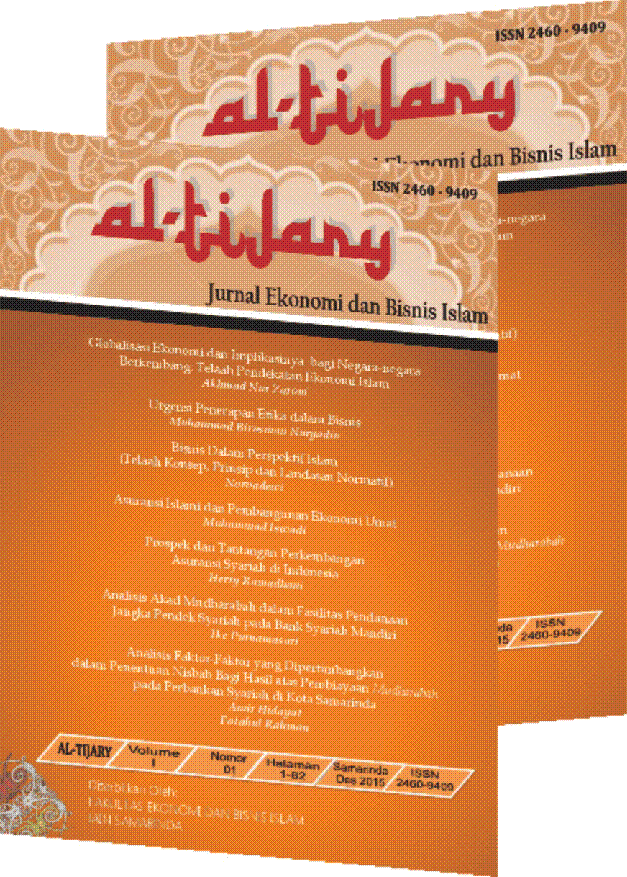Social Capital and Participation in Moslem Organizations
Abstract
Indonesia, as the country with the largest Muslim population in the world, has numerous Muslim organizations that play a significant role in the social and economic lives of its people. This study aims to address the impact of participation in Moslem organizations on social capital in a setting of a country with the biggest Moslem population in the world. A survey of members and non-members of Moslem organization Muhammadiyah in Bandar Lampung City was conducted. The quantitative approach is used to display the data on the degree to which Muhammadiyah Moslem organizations' involvement has impacted the social capital index. The data analysis technique used is propensity score matching (PSM) analysis. The findings demonstrated that members of Muhammadiyah and non-Muhammadiyah had different social capital indices. Additionally, a person's involvement in Muslim groups significantly affects social capital. It suggests that Moslem organizations are not only present to provide religious understanding for their members but also capable of providing added value for them, that is, the addition of social capital for each member. Based on the study, participation in Moslem organizations like Muhammadiyah significantly enhances social capital among members, suggesting that these organizations provide not only religious guidance but also valuable social benefits.
References
Baker, W., & Dutton, J. E. (2017). Enabling positive social capital in organizations. In Exploring positive relationships at work (pp. 325–346). Psychology Press. https://www.taylorfrancis.com/chapters/edit/10.4324/9781315094199-22/enabling-
Carmen, E., Fazey, I., Ross, H., Bedinger, M., Smith, F. M., Prager, K., McClymont, K., & Morrison, D. (2022). Building community resilience in a context of climate change: The role of social capital. Ambio, 51(6), 1371–1387. https://doi.org/10.1007/s13280-021-01678-9
Chen, Y. (April), & Starobin, S. S. (2019). Formation of Social Capital for Community College Students: A Second-Order Confirmatory Factor Analysis. Community College Review, 47(1), 3–30. https://doi.org/10.1177/0091552118815758
Claridge, T. (2018). Functions of social capital–bonding, bridging, linking. Social Capital Research, 20(1), 1–7.
Davenport, M., & Hassan, R. M. (2020). Social capital and self-organised collective action: Lessons and insights from a South African community project. Development Southern Africa, 37(2), 232–246. https://doi.org/10.1080/0376835X.2019.1628708
Hamilton, K., Heliwell, J. F., & Woolcock, M. (2016). Social Capital, Trust, and Well-being in the Evaluation of Wealth. In Policy Research Working Paper.
Hua, Y., Dong, F., & Goodman, J. (2021). How to leverage the role of social capital in pro-environmental behavior: A case study of residents’ express waste recycling behavior in China. Journal of Cleaner Production, 280, 124376.
Jiang, Y., & Zhen, F. (2022). The role of community service satisfaction in the influence of community social capital on the sense of community belonging: A case study of Nanjing, China. Journal of Housing and the Built Environment, 37(2), 705–721. https://doi.org/10.1007/s10901-021-09862-9
Kim, H.-Y. (2018). Effects of Social Capital on Collective Action For Community Development. Social Behavior and Personality: An International Journal, 46(06), 1011–1028.
Kim, N., & Shim, C. (2018). Social capital, knowledge sharing and innovation of small-and medium-sized enterprises in a tourism cluster. International Journal of Contemporary Hospitality Management, 30(6), 2417–2437.
Konno, N., & Schillaci, C. E. (2021). Intellectual capital in Society 5.0 by the lens of the knowledge creation theory. Journal of Intellectual Capital, 22(3), 478–505.
Lee, S., & Jung, M. (2018). Social capital, community capacity, and health. The Health Care Manager, 37(4), 290–298.
Lipka, M. (2017). Muslims and Islam: Key Findings in The U.S. and Around the World. Pew Research Center. https://www.pewresearch.org/fact-tank/2017/08/09/muslims-and-islam-key-findings-in-the-u-s-and-around-the-world/
Malone, J., & Dadswell, A. (2018). The role of religion, spirituality and/or belief in positive ageing for older adults. Geriatrics, 3(2), 28.
Martikke, S. (2017). Social capital: An overview. Manchester: Greater Manchester Centre for Voluntary Organisation. http://allcatsrgrey.org.uk/wp/download/public_health/Social-Capital-An-Overview.pdf
Mishchuk, H., Štofková, J., Krol, V., Joshi, O., & Vasa, L. (2022). Social capital factors fostering the sustainable competitiveness of enterprises. Sustainability, 14(19), 11905.
Mursid, S., Suharno, & Priatna, W. B. (2018). The Effect of Social Capital on the Innovation Performance of the Small-Middle Scaled Enterprises of Agribusiness in Bogor Regency. Indonesian Journal of Business and Entrepreneurship (IJBE), 04(01), 22–36.
Musavengane, R., & Kloppers, R. (2020). Social capital: An investment towards community resilience in the collaborative natural resources management of community-based tourism schemes. Tourism Management Perspectives, 34, 100654.
Nasution, A. (2016). Peranan Modal Sosial dalam Pengurangan Kemiskinan Rumah Tangga di Perdesaan Indonesia. Jurnal Ekonomi & Kebijakan Publik, 07(02), 171–183.
Nasution, A., Rustiadi, E., Juanda, B., & Hadi, S. (2014). Dampak Modal Sosial terhadap Kesejahteraan Rumah Tangga Perdesaan di Indonesia. Mimbar: Jurnal Sosial Dan Pembangunan, 30(02), 137–148.
Natadipurba, C. (2016). Ekonomi Islam. PT. Mobidelta Indonesia.
Neumayr, M., & Handy, F. (2019). Charitable Giving: What Influences Donors’ Choice Among Different Causes? VOLUNTAS: International Journal of Voluntary and Nonprofit Organizations, 30(4), 783–799. https://doi.org/10.1007/s11266-017-9843-3
Nguyen, T. C., & Rieger, M. (2017). Community-driven development and social capital: Evidence from Morocco. World Development, 91, 28–52.
Omelicheva, M. Y., & Ahmed, R. (2018). Religion and politics: Examining the impact of faith on political participation. Religion, State and Society, 46(1), 4–25. https://doi.org/10.1080/09637494.2017.1363345
Pramanik, P. D., Ingkadijaya, R., & Achmadi, M. (2019). The role of social capital in community based tourism. Journal of Indonesian Tourism and Development Studies, 7(2), 62–73.
Saiti, A., & Stefou, T. (2020). Hierarchical organizational structure and leadership. In Oxford Research Encyclopedia of Education. https://oxfordre.com/education/education/abstract/10.1093/acrefore/9780190264093.001.0001/acrefore-9780190264093-e-709
Shiell, A., Hawe, P., & Kavanagh, S. (2020). Evidence suggests a need to rethink social capital and social capital interventions. Social Science & Medicine, 257, 111930.
Slamet, Y. (2012). Modal Sosial dan Kemiskinan. UNS Press.
Torres, A., Sarmiento, O. L., Stauber, C., & Zarama, R. (2013). The Ciclovia and Cicloruta Programs: Promising Interventions to Promote Physical Activity and Social Capital in Bogotá, Colombia. American Journal of Public Health, 103(02), 23–30.
Tulin, M., Lancee, B., & Volker, B. (2018). Personality and Social Capital. Social Psychology Quarterly, 81(4), 295–318. https://doi.org/10.1177/0190272518804533
Wu, C. (2021). Social capital and COVID-19: A multidimensional and multilevel approach. Chinese Sociological Review, 53(1), 27–54. https://doi.org/10.1080/21620555.2020.1814139
Yunus, S., Zainal, S., Jalil, F., & Sari, C. M. A. (2020). Correlation of social capital and poverty farmers in Aceh. Humanities & Social Sciences Reviews, 8(1), 20–26.
Copyright (c) 2022 Al-Tijary

This work is licensed under a Creative Commons Attribution-NonCommercial 4.0 International License.








